| What's it like
to walk with someone in the rain who knew Albert Einstein? I
found out as I walk Mary to celebrate my newest grandson's baptism.
Along the way, I wonder what Albert would think today of a world on
the brink of biochemical war, racing to get nuclear power to threaten
others? I begin to realize his Fourth Theory, the one
related to Universal Unity, was more about Vigilance than Terror. |
 VigilanceVoice
VigilanceVoice
.jpg)
VigilanceVoice.com
Monday--September
16, 2002—Ground
Zero Plus 369
___________________________________________________________
Walking In The Rain In The
Shadow
Of Albert Einstein
___________________________________________________________
by
Cliff McKenzie
Editor, New York City Combat Correspondent News
GROUND ZERO, New York
City, September 16--As we exited Nativity Church where our grandson,
Angus, had just been baptized, Whiskers, a New York Bowery relic who lives
in the Catholic Worker on 1st Street, muttered to me.
"You walk her, Cliff."
Whiskers was struggling with his walker,
negotiating his way down the three steps leading into the East Village
Catholic Church on 2nd Avenue. His caretaker, a young girl who
just enlisted in Dorothy Day's hostel for the homeless, attempted to help
him down. Whiskers stomach protrudes as though it were weighted by
three overripe watermelons, oozing out his unbuttoned shirt tucked into
the pants donated by others to the Catholic Worker.
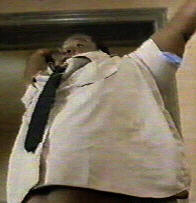
|
He points to the woman on
crutches. She wears a green hat and sunglasses, and her lips
are painted a bright red. I can't tell her age, but I know she is
infirmed by time.
"Okay, Whiskers," I reply. "Okay."
It is starting to rain. The crowd who
gathered for the noon Mass and baptism hurry out the door and head up 2nd
Street toward our daughter's apartment where food and Irish music await
them in celebration of Angus' baptism party. Besides the aunts,
uncles, cousins, grandparents, a host of Catholic Worker
volunteers--mostly young, idealistic people dedicated to working with the
street people of New York City--a collection of homeless will be
attending. They are the disenfranchised, marginalized people our
older daughter and son-in-law have dedicated their lives to working with
over the years. They too, are Angus' family, as they
were for Matt, now 6, and Sarah, 4.
Our daughter and son-in-law lived at the Catholic
Worker, cooking meals for the homeless, feeding, clothing, providing
community for them. They also, in accordance with Dorothy
Day's charter, offer peaceful protest against inequities among the poor,
and demonstrate against war and violence.
The Catholic Worker newspaper,
with a circulation of nearly 100,000, is a forum for their articles.
The newspaper is the only penny paper left in the country.
The rain pelts down. The crowd
hurries up Second Street, past the Marble Cemetery, locked so that vandals
don't spray the ancient headstones or deface the history of the dead, past
the corner of 1st Avenue and 2nd Street where Alice's restaurant once
provided the best and cheapest breakfast in New York City, but fell victim
to not paying its rent and is now replaced by Mama Bamba's, a semi-upscale
eatery whose prices double those of Alice's and who abandoned the Polish
"family" atmosphere for a more chic, ethnic appeal.
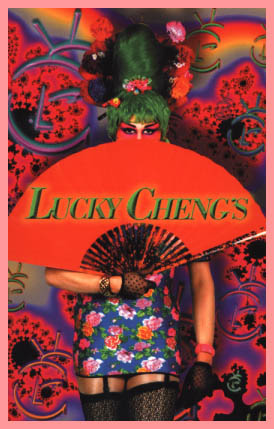 |
I watch the long line of
people hurry past the former S&M bar tucked in a non-descript doorway just
around the corner from the world famous Lucky Cheng's, where cross-dresser
waiters (waitresses) serve the curious public. The S&M
bar is gone, replaced by a Hawaiian eatery with live parrots staring at
you from the window instead of black-leather garbed dominatrix who would
spank you in public for $25 to the cheers of the groupies who gathered
there late at night.
"Mary," and I inch along. She moves
delicately on her crutches, victim of various ailments which prohibit any
fast movement. She seems nonplussed by the rain, as I am.
I let it wash over me. It is like a shower. The air is humid.
The rain is refreshing.
"I hope you don't mind moving so slow," she says
in a soft, halting Voice. I wish I could see her eyes.
Eyes tell tales of a person's inner being. But the sunglasses are
very large, hiding most of her face. It is dreary out,
overcast. I wonder why she wears them, but I don't ask.
"I'm so glad I saw this baptism," she says.
"I missed the other two. I was sick. They evicted me.
But Sabra and Joe helped me get back in. When lawyers gave up,
they got me back in."
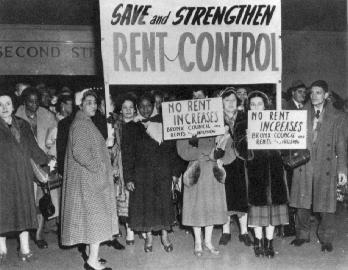 |
|
Catholic Workers
protesting rent hikes |
Mary tells me how my daughter
and son-in-law wrote letters that finally succeeded in Mary bending the
judge's ear. She had been evicted two years earlier from her
rent controlled apartment, and fought to get it back to no avail.
Then she pleaded for help. Our daughter and her husband
constructed a letter that won the judge's sympathy, and Mary was
reinstated in her one-room $400 apartment the landlord was renting out for
nearly $1,500.
"You don't mind walking slow?"
I tell Mary I have herniated disc, and walking
like a snail is okay. She shuffles her feet on the wet
pavement. She tells me about the East Village--how it was when
she first arrived in 1960.
"This was the drug capital of the world," she
says. "It took a while for people to accept me. People got
stabbed all around me. They just robbed me. They didn't
stab me. Thank God for the Catholic Worker."
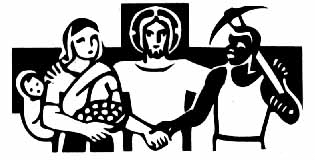 |
As we pass the Marble
Cemetery she tells me famous people are buried there. She
doesn't know any names, but she knows they are very famous, she says.
That's why it is always locked.
Then she tells me about meeting Albert
Einstein.
"He was very old. He looked like a
street person," says. "I thought he was one of us. Then he got
up and spoke. He was a guest lecturer. He was very old."
She can't remember what he said, but she
remembers how he was very old and still alive with energy. "I
think he was mad that his ideas led to making a bomb that could kill so
many," she says. "He was very old. Rumpled.
He didn't look famous."
I asked her if he lived nearby at one time.
"No, he lived in New Jersey where it was safe," she said.
The rain starts to pour. I take
my hat out of my Manhattan Messenger hip bag and cover my head with it.
I notice she is soaked, but the air is tepid. It is like a shower in
a warm room. I note her lipstick doesn't smear, and her eyes never
leave the ground.
I want to ask her how old she is. But
I know better than to ask an old woman such a question.
"He looked very rumpled," she repeats.
"But his eyes were alive. I saw youth in them."
She speaks of Einstein as though he were a neighbor, someone who came by
her apartment for tea and talk.
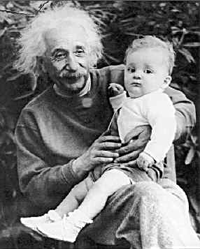 |
"I read that Einstein says human
beings were designed to live to be 150 to 160 years old," I say.
"That would be nice," Mary replies. "It
would be nice to live that long. To see everything change.
Everything changes, you know. This area used to be very bad.
Now it is nice. It's safe. It wasn't that way before.
You could get stabbed walking down the street."
We walk slowly across the intersection
where Alice's once was, past the corner deli with so many flowers lined
along its front your eye softens to the pastel palette, and your mind
forgets the ground upon which you walk was littered with blood from
victims who fought over drugs, or raped or stabbed others. You
forget the East Village was once a Land of Terror. But Mary didn't.
"It's nice here," she says.
"I'm glad to be back when it's safe."
As we near my daughter's apartment door,
Mary hesitates. In a smooth, grand motion she smoothly leans down
and deftly scoops up a wad of money someone dropped. It is sitting
in the middle of the sidewalk. She slides it in her pocket.
"Money," she says, "my lucky day."
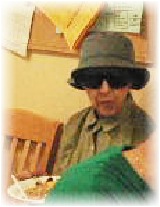
|
|
Mary |
We continue on.
I am amazed at how she moved, almost without stopping when she scooped up
the money. All the way her head was slightly bent downward,
and I thought it might be from her illness, but now wonder if she was
scanning the street for coins or bills. She extracted the
money from the cement with aplomb, as a crane might swoop down upon a
placid lake and scoop a fish into its bill without fluttering its wings in
the process.
"Einstein would have picked up the money
too," she said. "I think he was one of us at heart. I
think he was just a regular old person with a big brain."
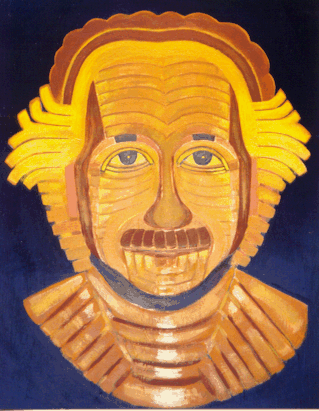 |
I open the door for
Mary and let her into our daughter's apartment. She is
swallowed into the crowd of people there to celebrate Angus' baptism.
She sits alone on a wooden chair, never taking off her sunglasses or her
hat, her head slightly thrust forward, marginally bent as though
genuflecting to some higher power.
I become busy taking pictures. I
forget about Mary.
Then this morning I read about how Israel is
preparing for war. I read about how the 1.8 million homes have a
requirement to have a "fortified room" ("bomb shelter,) and how Israelis
are preparing for an attack from Iraq should the U.S. wage war. In
the1991 Persian Gulf war 39 Scud missiles struck the country.
I also read how Saddam Hussein has purchased old
Russian planes to use in "suicide attacks" to drop "dirty bombs" on
Israel, contaminating the city with radiation. What shocked me
was that health officials state they have enough smallpox vaccine
stockpiled to inoculate the entire country of Iraq--6 million
population--and post Nine-Eleven America's headlines screamed there wasn't
any smallpox vaccine for Americans.
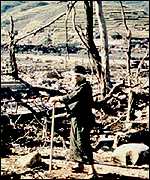 |
|
Post Nagasaki
atomic blast |
 |
I thought about "Mary's" visit with
Einstein. I wondered what he might think about the way the
world was dancing on the razor's edge of both nuclear and biochemical
devastation. I wondered if he really believed living to
be a hundred and fifty would be such a good idea were he alive today.
Einstein, born in 1879, died in Princeton, N.J., in 1955 at the age of 76.
If he was alive today, he'd be 123 and have 27 years yet to live. I
wondered if he could handle it.
Mary seemed to think living an eternal life
was good. But, in checking with sources about her past, I
found out the reason she wore the sunglasses was to secret herself.
She hid from the world behind them, the source alleged. And,
she suffered from delusions.
I wondered if she had really met Einstein.
I knew better than to discount the possibility. I had spent a
day with Buckminster Fuller, and were I to tell my story to someone
walking me up the street while wearing sunglasses in the rain, they might
question my veracity. Who was I, or anyone, to deny
another's truth, whether real or imagined?
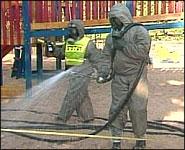
|
|
Israel
practicing how to handle a Chemical attack |
But I was sure of one
truth--that Terrorism is coiling. Israeli's are
preparing for the "gathering storm" of war, vaccinating their people,
getting their gas masks out, preparing tent camps where victims can flee,
muscling up their offensive strike capabilities to react to attack.
They even have their "fortified rooms,"
ready to hold up in when and if they come under the weight of Iraqi
retaliation. Their army chief of staff, Lt. Gen. Moshe Yaalon, says:
"We are prepared so that nothing will reach the area at all." His
comment is directed both at Hussein and the people of Israel.
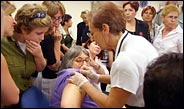 |
|
Israeli nurse
giving small pox Vaccine to medical worker in Jerusalem |
I wondered why
Israel was so prepared with gas masks and smallpox vaccine, and the United
States is as quiet as mouse about preparing its population for war.
If we are going to attack Iraq, it would seem logical our national defense
posture within communities would be on high alert, preparing our nation
for Terrorist attacks.
But our headlines don't speak to that
issue. On the surface, one would think we can bomb Iraq with
impunity, and whatever wrath is vented by Iraq against the U.S. will be
directed to Israel, not the U.S.
That seems so absurd to me.
It also seems negligent on the government's
part to not effect a national defense preparedness as Israel has done,
arming the population with emergency services and protections against
wanton, random retaliations by Terrorists seeking to wound America for
assaulting Iraq.
But no signs of such a warning are present on the
horizon.
I guess that's why I felt the shadow of Albert
Einstein walking with Mary as we made our way through the rain yesterday.
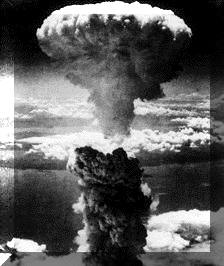 |
After all, Einstein was
responsible for formulizing modern warfare, for creating the key that
unlocked the door to nuclear fission that led to the development of the
Atomic Bomb.
Would he, at age 123, care about America being
ready for war, or, would he, as Mary did, wear sunglasses to hide himself
from the world, and only be excited about finding a swatch of money on the
sidewalk?
I hoped that Einstein, were he alive, would
be a trumpet of Vigilance, and demand Americans prepare for war--that its
citizens protect their children and families from potential harm.
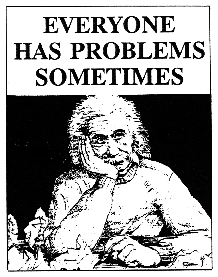 |
But the lack of such alarms made
me wonder if the ultimate Terrorism wasn't Complacency--the
lack of concern that American children will be caught in a nuclear
or biochemical or simply conventional cross-fire by Terrorists
within this country when and if the war begins.
I thought it was time for
America to take off its sunglasses and expose the Face of Vigilance
and quit looking for money on the sidewalk. I hoped Einstein
would agree.

Go
To September 15--Baptizing A Son Of Vigilance
©2001
- 2004, VigilanceVoice.com, All rights reserved - a
((HYYPE))
design
|
|

.jpg)















